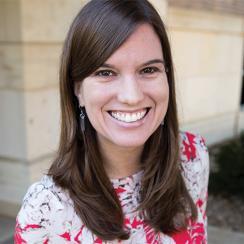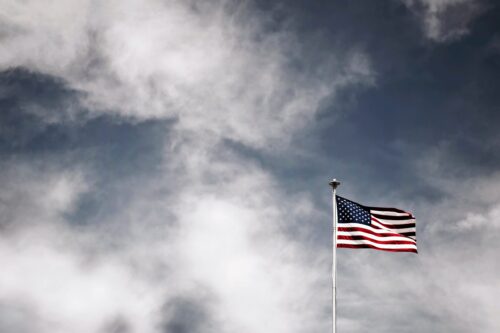I wanted to walk down the aisle to “Of The Father’s Heart Begotten,” not because of some particular affinity for the hymn, but because I love how singer-songwriter Jason Harrod ends it by going cosmic, as I call it, singing in falsetto “forever more and evermore,” straining toward the eschaton. I wanted there to be a sense that the wedding was caught up in something greater than itself – the final wedding feast – and gesture, at the start, toward the theological themes of “mystery” and “the new thing” present in the readings and songs. “You hear stories,” my husband Thomas later said, “of people who try to domesticate tigers. You can play with the tiger, maybe, but one day it might maul you.” Sometimes the unknown answers back.
Sometimes the unknown answers back.
Although scattered thunderstorms had been forecast for weeks, it was sunny all day on that southern mountaintop. Still, the rainbow stretching over the valley at the five o’clock start revealed rain somewhere on the horizon. The procession had begun when I walked out of the Grandview manor toward the stone courtyard, felt a mist or perhaps a drop, and said to the nervous staff, “I’m walking down that aisle.” Jason Harrod’s falsetto chorus barely began and tapered off as we made the decision at the altar to move to the tented patio. Right before the clouds gave way, every last one of us made it there, as did the Eucharist table – our end table borrowed from our Atlanta condo, adorned with chalice and bowl commissioned for the wedding – the sacramental materiality meant to manifest the presence of God. But transcendence can’t be contained, Karl Barth reminds us. Sometimes God speaks through the whirlwind.
Underneath the tent, the storm became tempest. Every time Paul, our celebrant and friend, tried to begin the ceremony, the rain pounded down harder still as if with intent, drowning out his words. The microphone and sound system were no use either for Paul or the readers as the rain swallowed the words, “For we know only in part, and we prophecy only in part, but when the complete comes, the partial will come to an end.” And lines from Dietrich Bonhoeffer, “We do away with mystery, because … we want to master everything and have it at our disposal. That is just what mystery will not let us do. … The very deepest mystery is when two persons grow so close to each other that they love each other. Nowhere in the world can a human being sense the power and the splendor of the mysterious as deeply as here.”
Directly behind us a bolt of lightning struck the slope of the mountain, so close we could smell the ozone burning. With sheer willpower and determination, the voice of my eighty-year-old mentor, Marilyn, finally broke through. She shook her cane toward the sky and shouted words from Isaiah, “I am about to do a new thing! Do you not perceive it?”
Directly behind us a bolt of lightning struck the slope of the mountain, so close we could smell the ozone burning.
Everyone gathered there responded with song, “What though the tempest loudly roars, / I hear the truth, it liveth. / What though the darkness round me close, / songs in the night it giveth,” a hymn we had picked in part to honor our students in a Georgia women’s prison. “In prison cells and dungeons vile / our hearts to them are winging. / When friends by shame are undefiled, / how can I keep from singing?”
Later, after the reception as Thomas and I drove down the mountain processing what had just happened, he said, “If someone had given me a choice of themed weddings – a backyard wedding, an ocean wedding, a church wedding, or a wedding where we shouted into the tempest, ‘No storm can shake my inmost calm,’ – I’d be like, ‘Yeah, I’ll take that one.’”
In an essay Thomas began for our engagement and gave me days before our wedding, he laid out the distinct character of his agnosticism. For him, agnosticism is an affirmation of the unknown, not a negative stance that prevents us from making claims because of the limits of our knowledge. This is why he supports so well my articulation of theology, as I risk precise and particular claims grounded in dynamic tradition, even if we don’t share the same confession. Affirming the unknown doesn’t have to silence us.
For him, agnosticism is an affirmation of the unknown, not a negative stance that prevents us from making claims because of the limits of our knowledge.
Theological traditions that prioritize divine transcendence tend toward a certain kind of silencing. They tend to speak of transcendence only as disruption, emphasizing the distance between the divine and human and therefore the inadequacy of every human attempt at meaning making. Divine in-breaking is seen as crisis or negation – judgment on human experience and understanding. But this is not all there is to transcendence, I’ve come to see. The tempest echoed our words and intensified them. It validated our attempt to invoke mystery and anticipate a new thing – and affirmed our human daring. It threw us not so much off course but into a rhythm and play, even as the storm brought with it danger and uncertainty. It drew all of us there into a wild, full-bodied practice of call and response.
Theological traditions that prioritize divine transcendence tend toward a certain kind of silencing. They tend to speak of transcendence only as disruption, emphasizing the distance between the divine and human and therefore the inadequacy of every human attempt at meaning making.
“When we affirm the unknown, we leave it wild and free before us and us wild and free before it,” Thomas tells me, appealing to the French philosopher Georges Bataille. “We affirm our own freedom and wildness, what we don’t know about ourselves, what we can’t master, predict, or control.” The storm enabled us – even compelled us – to be uninhibited, uncalculated, unselfconscious, to turn outward. “When we were all singing together, those were the moments when I felt that,” Thomas said. “The only adequate response to the arrival of the unknown was our collective singing.”
Concerns about safety moved us again, this time standing packed side by side in the Mountain Lodge Room, circled around the Eucharist table, the words on the Eucharist bowl prominently displayed: “In all this we are in a fellowship that sustains us. Yes and Amen to it all. That Yes and Amen is the firm ground on which we stand.” We said our vows and continued to sing lines from “One Voice,” “surrendering to the mystery,” and a Eucharist hymn based on Luke 1, “By your tender mercies, may your dawn break upon us.” The sun reappeared. The storm left as quickly as it came.

Jennifer M. McBride (Ph.D. University of Virginia) is Associate Dean of the Doctor of Ministry Programs and Assistant Professor of Theology and Ethics at McCormick Theological Seminary in Chicago. McBride is author of The Church for the World: A Theology of Public Witness (Oxford University Press, 2011) and co-editor of Bonhoeffer and King: Their Legacies and Import for Christian Social Thought (Fortress Press, 2010). She serves as president of the International Bonhoeffer Society – English Language Section. Her work has appeared in popular publications like The Christian Century and CNN.com and has been featured in the New York Times. McBride’s most recent book, Radical Discipleship: A Liturgical Politics of the Gospel (Fortress Press, 2017), is based on her experience teaching theology in a women’s prison and participating in the Open Door Community, an intentionally interracial, residential Christian activist and worshipping community in Atlanta, Georgia, that has been engaged in mercy and justice work on behalf of the homeless and prison populations for over thirty-five years. McBride was a professor and close friend of Kelly Gissendaner, who was the only woman on Georgia’s death row until her execution in September 2015, and was a leading activist in the international #kellyonmymind campaign.



Unbound Social